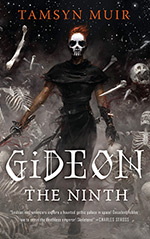
![]() Arifel
Arifel
1/2/2020
![]()
The Queer NecRomantic Murder Mystery You've Been Missing All your Life
To say that Gideon the Ninth, the debut novel from Tamsyn Muir, has been the subject of some hype is like saying the Pacific Ocean is a bit wet. The hype about this skeleton-based queer adventure has been slowly taking over my Twitter feed since the end of last year, and its regularly felt like the universe was divided into those "lucky" few who had already read it (and were therefore falling over themselves to talk to the rest of us about skeletons) and everyone else waiting for the release to roll around. At last, dear readers, I have graduated into the ranks of the skeleton analysts.
Was it worth it? Oh, very yes.
Gideon is an orphan raised in indenture to the Ninth House, a crumbling ruined cult living on a nigh-uninhabitable planet, now facing total extinction. Ignored by most and openly tormented by the only other girl her age, Reverend Daughter Harrowhark, Gideon has been plotting her escape for years and on her eighteenth birthday, now finally has her chance to make her way off planet and into a marginally better life. On the verge of making good on her escape, Harrow outwits her at the last minute, only to instead offer to take her as a "cavalier", a sworn bodyguard to the House's necromancer, on a very different sort of quest. The First House - that of the Emperor - has offered a challenge, enabling a representative from one of the houses to ascend to the Emperor's services if they can successfully complete a task on the deserted First House planet. Left without a choice (and clearly intrigued and also maybe a bit into Harrow) Gideon takes on the challenge, taking a crash course in what it takes to be a cavalier before setting off to a crumbling house for an uncertain contest with the other seven houses. And then, of course, the murders begin.
In its worldbuilding, Gideon the Ninth takes a particular kind of claustrophobic gothic sensibility - one that's embodied in speculative work like Gormenghast and Under the Pendulum Sun - and applies it on an interplanetary scale whose mechanics are vague but also irrelevant. There's an empire, which we don't get a whole lot of information on, but whose leadership appears to be at the least chronically absent from the house structure its created. These houses specialise in upholding different aspects of the empire, ranging from practical services like "being soldiers" or "managing the library" to more nebulous professions like "being likeable", "thinking you're good at diplomacy but you're not, actually", "dying of attractive forms of consumption" and, of course, "skeletons". There's definitely an evolution to be drawn here from the districts of the Hunger Games or factions of the Divergent trilogy (and before those, the Hogwarts Houses) to this distinctly non-YA portrayal of a dysfunctional and yet internally meaningful classification system; in practical terms, the houses allow Muir to introduce a lot of characters and give them motivations in a relatively short space of time, and to allow the representatives of the Ninth House their own pre-existing prejudices and conflicts with those houses, while still maintaining them as outsiders to civilised company. Almost all of the supporting characters grow beyond the stereotypes of their house depiction (the main exception is the soldiers of the Second House, but they play their role and further nuance is not really missed), creating a highly satisfying political-necromantic soap opera which gets more desperate as the body count starts to build.
http://www.nerds-feather.com/2019/09/microreview-book-gideon-ninth-by-tamsyn.html